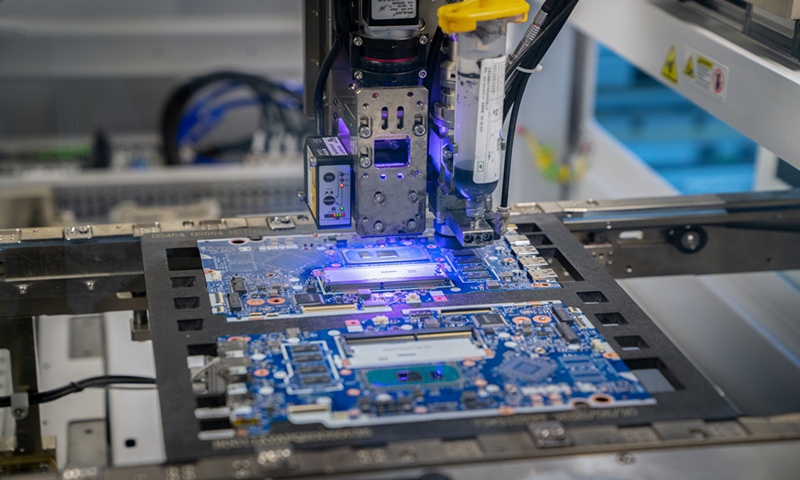
A chip manufacture machine Photo: VCG
China's Ministry of Commerce (MOFCOM) said on Wednesday it firmly opposes Washington's abuse of export controls and relentless attacks on certain Chinese firms, after the US revoked chip export licenses to Huawei amid suppression of China's tech sector.
The US revoked licenses that allowed companies including Intel and Qualcomm to ship chips used for laptops and handsets to Huawei, Reuters reported on Tuesday, citing people familiar with the matter.
The US Commerce Department confirmed that it had revoked some licenses, without specifying which, according to the report.
The US export restrictions on the purely civilian use of chips are a typical act of economic coercion, which violates WTO rules and harms the interests of US firms, the MOFCOM said.
The actions taken by the US seriously violate its commitments to "not seeking decoupling from China" and "not hindering China's development" and they contradict the claim of "accurately defining national security," the MOFCOM added.
The move came after Huawei launched its first artificial intelligence-enabled laptop last month that uses Intel's new Core Ultra 9 processor, which drew fire from some US politicians, who claimed that such licenses had contributed to Huawei's resurgence.
Huawei was put on a US trade restriction list in 2019 meaning that the company's suppliers have to seek a special, difficult-to-obtain license before shipping. The licenses allow Qualcomm to sell older 4G chips for Huawei's handsets and Intel to ship central processors to Huawei for use in its laptops, Reuters reported.
US House Foreign Affairs Committee Chairman Michael McCaul confirmed the administration's decision in an interview on Tuesday. He said the move is key to preventing China from developing advanced artificial intelligence (AI), Bloomberg reported.
Experts said that it is impossible for the US to stop China's development of advanced AI through these restrictions, and the measures taken by the US will only make Chinese companies more determined to develop alternatives.
These export restrictions mainly affect end products, which may have a short-term impact on the sales of some low-end Huawei phones and some laptops, but the long-term impact will not be significant, Xiang Ligang, director-general of the Beijing-based Information Consumption Alliance, told the Global Times on Wednesday.
Xiang said that the US sanctions have forced Huawei to become even stronger. Huawei last year launched a new phone using its self-developed Kirin 9000S chip, a breakthrough that it was forced to make under the US sanctions.
As for laptop chips, if they are truly cut off, it will also make Huawei more determined to develop its own computer chips, Xiang said.
Despite the US restrictions, Huawei's revenue continues to grow rapidly. In the first quarter, Huawei achieved revenue of 178.45 billion yuan ($24.69 billion), up 36.66 percent year-on-year. Net profit rose more than fivefold to 19.65 billion yuan.
According to market research firm Canalys, in the first quarter, Huawei regained the top spot in the Chinese mainland smartphone market after 13 quarters, with a share of 17 percent.
Ma Jihua, a veteran telecom industry analyst, said that in response to the increasing chip capabilities of Chinese technology companies, the US has no more cards to play except to constantly patch up existing restrictions, a move that shows its bitterness in the face of China's technological advances.
The tightening of restrictions is merely a maneuver by certain US politicians to showcase their toughness on China. The actual impact is likely to be minimal and the effectiveness of the restrictions will diminish over time, Ma told the Global Times on Wednesday.
Forcing malicious competition against China, decoupling and cutting supply chains will only result in mutual harm, experts said.
As Chinese companies are progressing toward self-sufficiency, the performance of US companies is severely affected by the restrictions, resulting in weak demand for their products.
Bloomberg reported that Huawei is no longer among the top 10 customers of Qualcomm, and it is also not on Intel's list of top customers.
In April, Intel said its second-quarter revenue and profit would be below market estimates as it faces weak demand for its traditional data center and personal computer chips and trails in the surging market for AI components.




